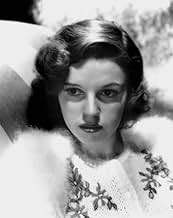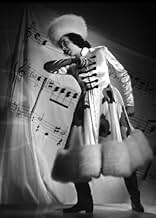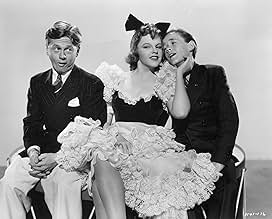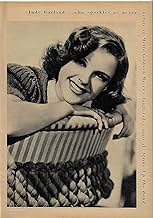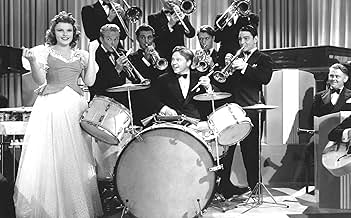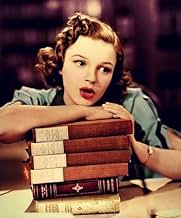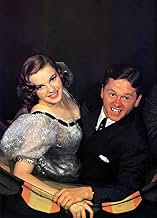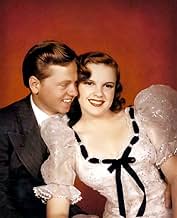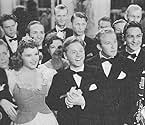IMDb RATING
6.8/10
2.1K
YOUR RATING
A high school boy wants to become a professional musician, and his gal pal wants to become his best girl. They work together staging big band shows with fellow classmates in the hopes of hit... Read allA high school boy wants to become a professional musician, and his gal pal wants to become his best girl. They work together staging big band shows with fellow classmates in the hopes of hitting it big.A high school boy wants to become a professional musician, and his gal pal wants to become his best girl. They work together staging big band shows with fellow classmates in the hopes of hitting it big.
- Won 1 Oscar
- 4 wins & 2 nominations total
Jack Baxley
- Ice Cream Concessionaire
- (scenes deleted)
Featured reviews
Admittedly, I'm not the best judge of musicals, but this one seems disappointing given the level of talent involved. Visually, Garland and Rooney make a cute couple-- a match clearly made in malt shop heaven. And, even though I was disappointed, I can understand Garland's enduring appeal. She's definitely an incandescent presence, and one that doesn't come from just acting the part. On the other hand, Rooney is energetic and I can see him organizing a high school band. However, that energy too often becomes manic—for example, check out his conducting the orchestra at movie's end for sheer pointless delirium. Too often, his in- your-face high spirits comes across as more obnoxious than entertaining.
I guess my biggest disappointment is with the musical numbers. Berkeley's dancing phalanxes are eye-catching as usual, but there's not a single catchy tune to hang your hat on. The numbers are simply not up to Garland's level of show-stopping talent, whatever the reason. Then there's the overlong melodrama skit that unfortunately saps momentum by coming in the middle. On the other hand, the musical fruit sketch sounds silly but is really charming and well done. Also, professional musician Paul Whiteman turns out to be a pretty darn good actor. And for those interested in what those times were like, it's a chance to see what teens circa-1940 thought was "cool". Having your own dance band was clearly near the top. At the same time, the message seems to be that dance bands deserve respect, while playing in one is indeed a legitimate goal in life. Looks like controversies over music didn't start with rock-and-roll.
I guess my biggest disappointment is with the musical numbers. Berkeley's dancing phalanxes are eye-catching as usual, but there's not a single catchy tune to hang your hat on. The numbers are simply not up to Garland's level of show-stopping talent, whatever the reason. Then there's the overlong melodrama skit that unfortunately saps momentum by coming in the middle. On the other hand, the musical fruit sketch sounds silly but is really charming and well done. Also, professional musician Paul Whiteman turns out to be a pretty darn good actor. And for those interested in what those times were like, it's a chance to see what teens circa-1940 thought was "cool". Having your own dance band was clearly near the top. At the same time, the message seems to be that dance bands deserve respect, while playing in one is indeed a legitimate goal in life. Looks like controversies over music didn't start with rock-and-roll.
It's another "let's put on a show!" movies starring Mickey Rooney and Judy Garland! I saw Strike Up the Band before Babes in Arms, and while I thought it was silly at the time, compared to the earlier flick, it's as epic as Gone With the Wind.
Mickey takes the lead as a high school student far more interested in his drum set than preparing to become a lawyer to fulfill his mother's dream. Judy's in love with him, but he doesn't care about girls, only music. A lowerclassman, Larry Nunn, is in love with Judy, and when June Preisser shows up batting her eyelashes at Mickey, it stars an extremely uninteresting love quadrangle. Mickey isn't really interested in June; he's just getting into the show's rehearsals. Judy isn't interested in Larry, even though he's clearly the better choice. Larry proposes marriage and promises to never go out with other girls, the same evening that Mickey's stood Judy up to go out with June. Larry's only thirteen and offers to wait until she's ready, and when she turns him down, it's heartbreaking to see his face. Why doesn't she just tell him to wait? By the time she's gotten Mickey out of her system, Larry will probably have grown up and gotten over his crush. No heartbreak necessary. Plus, compared to the disinterested, unreliable, pushover Mickey, Larry's a dream!
If you're going to watch this one, it's either because you love the silly Mickey-Judy movies or because you want to see another Busby Berkeley musical. Busby Berkeley movies have such a special feeling to them, that even though they're dated and the music isn't always great, you're going to see someone who put a lot of thought into his craft instead of just "Let's put on a show!" like the people in his movies. You'll get to see his classic angles and beautifully framed shots, but you might not like the rest of the movie. Both leads are in their super-hyper phases, and since we know what we know about how old Hollywood fed the kids drugs to give them pep, it's not really too much fun to see them bouncing off the walls. "Who's been feeding you vitamins?" Judy jokes when Mickey approaches her with particularly intense energy. It's just not funny to hear her say that, since everyone knows they weren't really vitamins. There's just so much energy a person can put into the conga line before someone notices he's not really normal.
Mickey takes the lead as a high school student far more interested in his drum set than preparing to become a lawyer to fulfill his mother's dream. Judy's in love with him, but he doesn't care about girls, only music. A lowerclassman, Larry Nunn, is in love with Judy, and when June Preisser shows up batting her eyelashes at Mickey, it stars an extremely uninteresting love quadrangle. Mickey isn't really interested in June; he's just getting into the show's rehearsals. Judy isn't interested in Larry, even though he's clearly the better choice. Larry proposes marriage and promises to never go out with other girls, the same evening that Mickey's stood Judy up to go out with June. Larry's only thirteen and offers to wait until she's ready, and when she turns him down, it's heartbreaking to see his face. Why doesn't she just tell him to wait? By the time she's gotten Mickey out of her system, Larry will probably have grown up and gotten over his crush. No heartbreak necessary. Plus, compared to the disinterested, unreliable, pushover Mickey, Larry's a dream!
If you're going to watch this one, it's either because you love the silly Mickey-Judy movies or because you want to see another Busby Berkeley musical. Busby Berkeley movies have such a special feeling to them, that even though they're dated and the music isn't always great, you're going to see someone who put a lot of thought into his craft instead of just "Let's put on a show!" like the people in his movies. You'll get to see his classic angles and beautifully framed shots, but you might not like the rest of the movie. Both leads are in their super-hyper phases, and since we know what we know about how old Hollywood fed the kids drugs to give them pep, it's not really too much fun to see them bouncing off the walls. "Who's been feeding you vitamins?" Judy jokes when Mickey approaches her with particularly intense energy. It's just not funny to hear her say that, since everyone knows they weren't really vitamins. There's just so much energy a person can put into the conga line before someone notices he's not really normal.
No I don't care what anybody says Mickey Rooney and Judy Garland were excellent miss film both young actors at the time and the singing and the music was superb. Yeah I mean it was a film on a 1940 remember that! But I loved Judy Garland and always will
A delightful high-energy romp. I think Mickey Rooney outshines Judy Garland in this one (but that might be like comparing apples to oranges, which incidentally play a not incidental role in this movie). Mickey plays the piano, the drums, sings, dances, pitches baseballs and jumps over fences and hedgerows....plus he's good to his widowed mother and turns up the "life's a gas" charm at the drop of a hat. Judy is more serious, reflective, and tender, all of which works well in the songs she performs. I could have done without the extended "Snidely Whiplash" melodrama routine, but hey, what's perfect in this world. The teenagers in this movie, however, look like miniature adults, and moreover, some of Mickey's band members look a little long in the tooth. Was there really a time when jazz was the most shocking thing a kid could be interested in?
"Strike Up the Band" is another teaming of Mickey Rooney and Judy Garland who are of course put in the position of putting on a show to save a band, a school program for children, a school from closing, etc. You name it. It could be any of those things. Of all the movie musicals that were made in their heyday, these were the most bizarre, meaning while enjoyable and with good music still somewhat beyond belief. They always seemed to defy the odds, getting what they want, albeit with some obstacles along the way. This outing though is not quite as good as others, due to some of the supporting actors' not so subtle acting. Less is more is not an adage used here. In fact, there's nothing subtle here. Ann Shoemaker does give good support as his mother, with a nice speech about being a great man. But the length, its feeling of self-importance, and some awkward moments of corniness hurt its effectiveness. It is very enjoyable with great musical numbers for Mickey and Judy; but there's just so much of everything here, making it two whole hours, including a over-the-top tongue-in-cheek save-the-damsel production in the middle of the movie, lasting 15 minutes itself. I'm sure you'll enjoy it for what it is, but afterwards, you'll feel like you had a workout.
Did you know
- TriviaThe original camera negative was destroyed in May 1978 during a nitrate film fire in the George Eastman House archives. The fire also destroyed 328 other films' original camera negatives.
- GoofsIn an anachronism typical of movie musicals of the time, when Mickey and Judy's band wins the competition, it is announced that musicians, singers and dancers from the various competing orchestras will perform an impromptu big number together. Even though they've never met before, nor rehearsed, nor had even five minutes to create sets and costumes, everything comes off seamlessly and with M-G-M's usual level of polish.
- Quotes
Paul Whiteman: Take that little fellow on the street. Teach him to blow a horn and he'll never blow a safe.
- ConnectionsEdited into Hollywood: The Dream Factory (1972)
- SoundtracksStrike Up the Band
(1927)
Music by George Gershwin
Lyrics by Ira Gershwin
Played during the opening credits
Sung by Judy Garland (uncredited), Mickey Rooney (uncredited), and chorus in the finale
- How long is Strike Up the Band?Powered by Alexa
Details
- Release date
- Country of origin
- Language
- Also known as
- Armonías de juventud
- Filming locations
- Production company
- See more company credits at IMDbPro
Box office
- Budget
- $838,661 (estimated)
- Runtime2 hours
- Color
- Aspect ratio
- 1.37 : 1
Contribute to this page
Suggest an edit or add missing content



